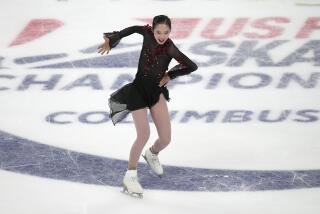Top U.S. Skater Attacked, May Be Out of Trials
- Share via
DETROIT — For the second time in nine months, a prominent woman athlete became the target of an assailant Thursday when champion figure skater Nancy Kerrigan, one of the favorites to win a gold medal in next month’s Winter Olympics in Norway, was attacked after a practice at the U.S. championships.
Eyewitnesses said a man charged Kerrigan from behind while she was headed toward the dressing room at Cobo Hall and struck her two or three times around the right knee with an unidentified blunt object, perhaps a tire iron or a crowbar. He then broke a large plexiglass door and escaped.
Kerrigan, 24, of Stoneham, Mass., was taken to Hutzel Hospital, where X-rays revealed no fractures. Steven Plomaritis, an orthopedic surgeon who treated her, said the skater suffered a bruised and cut knee and might be in too much pain to skate today in the opening phase of the women’s singles competition.
“It’s not the most important thing, skating. If I can’t, I’ll have to deal with it,” Kerrigan told ABC television in an interview. “I’m OK. It could have been a lot worse.
“I won’t lose faith in people. That’s just one bad guy. I’m sure there are others because it’s happened in other sports.”
Limping when she returned to her hotel from the hospital, Kerrigan told her coach, Evy Scotvold, that she would not attend a previously scheduled practice session late Thursday night because of swelling in the knee.
A spokesman for Detroit Mayor Dennis Archer said police are searching for the attacker, who, one eyewitness said, might have been videotaping Kerrigan from the stands during her practice.
“It appears to be a planned, premeditated attack,” said Atanas Ilitch, vice president of Olympia Arenas, which manages Cobo Hall in downtown Detroit. “That’s my presumption.”
Meanwhile, U.S. Figure Skating Assn. officials were meeting to determine whether their rules would offer Kerrigan an opportunity to earn one of two women’s berths on the team for the Winter Games in Lillehammer, Norway, Feb. 12-27 if she does not compete in the national championships, which serve as the Olympic trials. Kerrigan, the defending national champion, won a bronze medal in the 1992 Winter Olympics.
“She’s really trying to be optimistic and be strong, but, initially, she was terrified,” Scotvold said. “She has to realize she is a visible person and that for the rest of her visible life she needs protection.”
Protection of athletes has been an issue in sports since April, when the world’s No. 1 woman tennis player, Monica Seles, was stabbed in the back with a knife by a spectator during a break in play during a tournament at Hamburg, Germany.
The assailant later revealed that he had acted because he wanted his favorite player, German Steffi Graf, to regain her No. 1 ranking. Because of injuries she suffered in the incident, Seles has not played in a tournament since. Graf is now No. 1.
It is not unusual for women figure skaters to receive threats. In November, Tonya Harding, expected to contend here for a berth on her second Olympic team, withdrew from a competition in her hometown of Portland, Ore., after an anonymous caller said she would “get a bullet in the back” if she skated.
Harding said in a news conference Wednesday that she since has employed a security service to protect her at home but would not reveal whether she had arranged for additional protection here this week.
A Westminster, Calif., man, Harry Veltman III, was sentenced in June, 1992, to 37 months in federal prison after sending threatening letters to German figure skater Katarina Witt, a two-time Olympic gold medalist.
Kerrigan’s agent, Jerry Solomon, said he has had no reason before Thursday to be concerned about the skater’s security.
“She gets a lot of letters that say a lot of things,” he said. “A lot of people out there say crazy things in letters. But there has been nothing to put us in a frame of mind to be careful.”
Having completed her practice only moments before, Kerrigan walked through a blue curtain that separates the rink from the hallway leading to the dressing rooms and was blindsided.
“This guy came running out from behind the curtain, just came bolting,” said Dana Scarton, a reporter for the Pittsburgh Post-Gazette who was attempting to interview Kerrigan.
“I think he hit her more than once. Some people have said it was a nightstick or a tire iron or a crowbar, but, to me, it looked like it had a whip on the end of it. Maybe it was just the way he was swinging it.
“He was running the whole time. He ran right up to where she was, hit the back of her knee and then kept right on running out of there.”
Kerrigan collapsed onto a red carpet in the hallway, asking, through her tears, “Why? Why? Why me?”
Her father, Dan, picked her up and carried her to a room, where she was treated by Plomaritis. Eyewitnesses gave police sketchy details about the man’s appearance--white, six feet tall, black cap, black shirt, black shoes, white or tan pants. One said she believed that the assailant was wearing a credential around his neck that would have allowed him access to the practice arena.
Kerrigan, a skater known for her artistry, finished third in the 1992 Winter Olympics in Albertville, France, behind gold medalist Kristi Yamaguchi of the United States and Midori Ito of Japan, then followed that a month later with a second-place finish in the World Championships.
But after winning last year’s national championship, she skated poorly in the World Championships in Prague, Czech Republic, and dropped to fifth.
With renewed confidence after regular visits to a sports psychologist, she recently declared herself the favorite not only here, but also in the Olympics.
More to Read
Go beyond the scoreboard
Get the latest on L.A.'s teams in the daily Sports Report newsletter.
You may occasionally receive promotional content from the Los Angeles Times.






